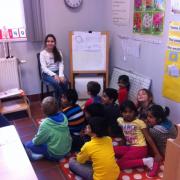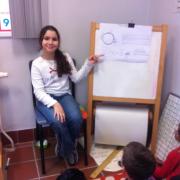Numeracy, literacy, IPC and PE... Upper Primary pupils are doing their best to finish off their weekly assignments this week. It is a short school week, and all the routines are a bit upside-down. The spelling test and basic facts test took place on Wednesday instead of Monday, homework went out Thursday instead of Wednesday, the PE lesson started earlier - and the PE lesson is, from this week on, longer than is used to be. Even so, we have tried to work with the things we normally work with during a school week.
The pupils are working with different objectives in numeracy. Pupils in year 3 are learning more about the connection between addition and multiplication, and between multiplication and division. The year 4 focus is counting on in 2s, 3s, 4s, 5s, 10s, 25s and 50s as well as recalling multiplication and division facts. Pupils in year 5 and 6 are busy halving and doubling numbers, by identifying near doubles, using known doubles and including decimals, and also learning new strategies doing this.
In literacy we have started looking at the specific text type recount. We started our Thursday morning with reading a recount about a school trip. We studied the text to see if it answered the questions Who? Where? When? What? Why? and How?. A recount should retell a series of events, sequenced in time, and it should also be written in a descripive language. We discussed the text we had read to see if we could tick off that list. We could. We then wrote a recount together. We wrote a draft and then we worked with the text to make it better. We wrote and added details, expressed more feelings and explained some parts of the text in a better way. The plan is that the pupils will be able to write a recount independently, by looking at a model text and writing a recount about something they experienced.
During one of our IPC lessons this week we worked with a science experiment. We were supposed to attach a string to two spoons and hang them on a longer string. So far, so good. The spoons started chiming against each other. We were then supposed to hold the ends of the sting and put it really close to our ears and jangle the spoons. Here the problems started. The string was not strong enough and kept on breaking. The spoons kept on falling down. We looked at each other and asked what the purpose of this activity was. Hmm, there was a great plan... We were supposed to, through this investigation, discover how sound vibrations travel through the spoons and through the string. We will show resilience and not give up - we will try this experiment again, next time with a better string!
Nothrathcha and Rotem holding the two spoons on the string --- before the string broke and the spoons fell on the ground...



 Besma shared her 'eye-reseach' with the pupils in Lower Primary. They listened with great interest and asked many questions about the eye and how the eye works! A presentation is a great way to share knowledge, but also to make it clear to yourself how much you actually know about something. Besma did a good job!
Besma shared her 'eye-reseach' with the pupils in Lower Primary. They listened with great interest and asked many questions about the eye and how the eye works! A presentation is a great way to share knowledge, but also to make it clear to yourself how much you actually know about something. Besma did a good job!